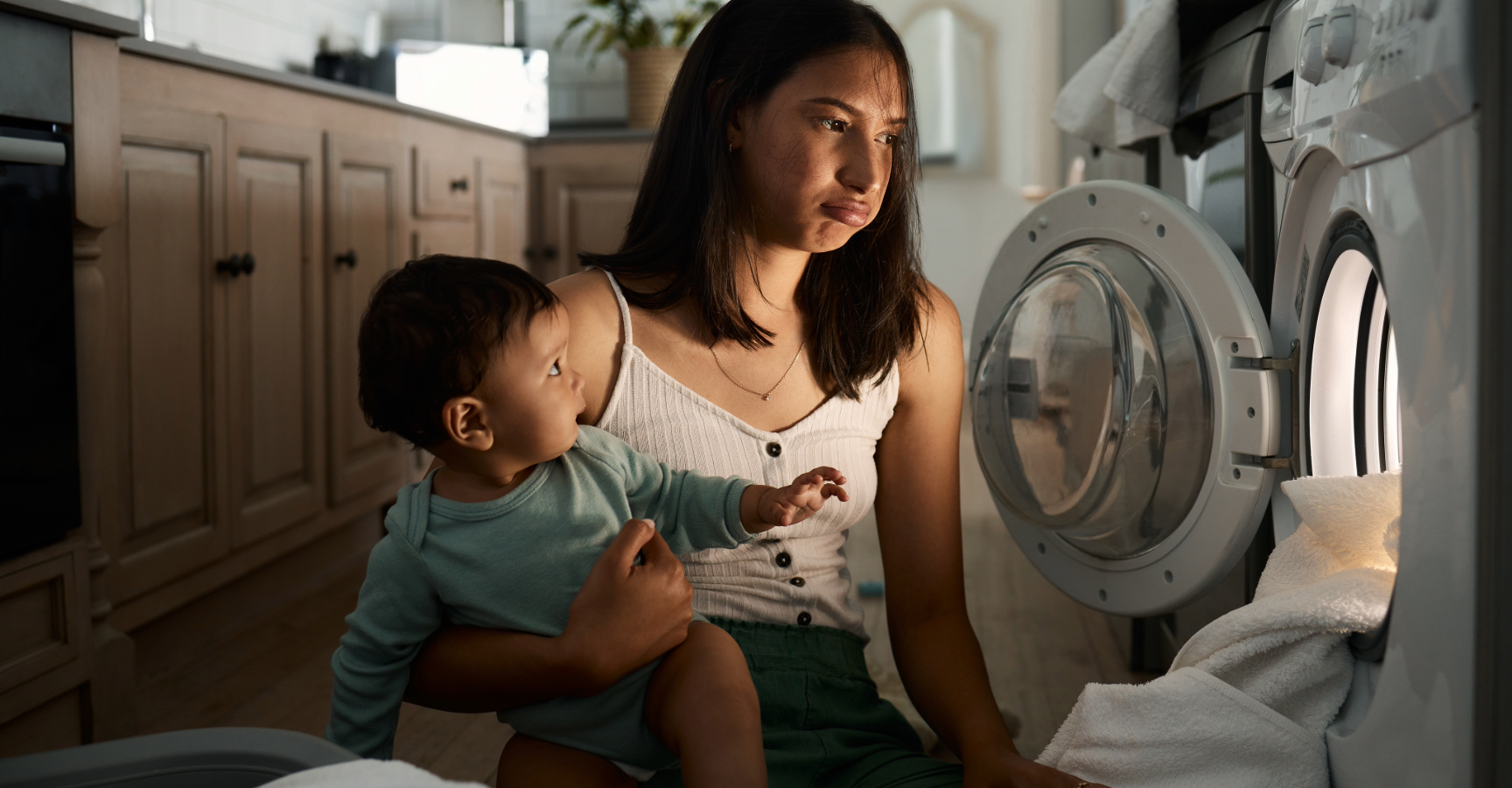
The unpaid, and often invisible, work of parenting is crucial for the well-being of children and families, and also underpins a healthy and thriving society. It’s also hard and often relentless work. Caring for little ones requires a significant investment of time, effort, and hard-earned skills. Calmly managing toddler tantrums is not for the faint-hearted, especially while juggling endless cleaning tasks, fostering children’s development and managing busy schedules, all often performed on little sleep! Equally, preparing three meals and countless snacks each day can feel like a full time job on its own, with a huge invisible mental load behind preparing even one meal.
The dollar value of unpaid care work in Australia is estimated to be $650.1 billion, which is equivalent to 50.6% of GDP.[1] And yet, this important work continues to remain undervalued and highly gendered, contributing to persistent gender inequality.
Mums, particularly those in different-sex relationships,* (regardless of whether they are in any form of paid work) typically take on substantially more of this unpaid caring and household work[2]. In fact, it’s estimated that the average Australian mum works 80 hours per week[3] with other studies indicating it may be as high as 98 hours per week[4]. If stay at-home-parents were paid a salary for all of the various jobs and tasks performed at home (from cook to cleaner and household manager), it’s estimated it would pay $225,000 AUD each year.[5] No wonder mums everywhere are tired!
*Evidence suggests unpaid work is generally more evenly shared in same-sex relationships but more work can still fall on the primary caregiver.
Doing all of this work also means mums tend to find little time for their own health and wellbeing. For example, almost two-thirds of mums surveyed said they often eat on the run and over half struggle to eat nutritious foods because of the demands of their schedule.[6] Sound familiar?
Even as caring responsibilities decrease as children get older, evidence suggests that the time women spend on housework such as cooking, cleaning, taxi-ing children to and from activities, and washing remains pretty static at around 25-30 hours per week.[7]

This Work Matters and is Critical for Children's Wellbeing
We know that this work is incredibly important. The first five years of children’s life lay the foundations for children’s health and development.[8] During this time, children’s brains make more connections than at any other time. It’s when social and emotional skills, thinking and communication skills develop. Forming positive relationships, having opportunities to build social and emotional skills, to play and learn, and access to healthy food are the building blocks for these skills. The first few years can also help to set up healthy eating habits for life.
Of course, knowing this can sometimes make parents feel a lot of pressure to ‘do all the right things’, which can add to the (already big!) mental load. So it’s important to also know that research shows having a loving and positive relationship with your children is the most important part, and naturally lends itself to developing many of these other skills (fostering social and emotional skills, for example). There is no manual for parenthood so it’s a bit of ‘best judgement, trial and error’ for everyone, and that’s ok.
Women Experience the Motherhood Penalty
While gender inequalities in unpaid work exist across the lifespan - parenthood, unsurprisingly, is when the difference is most stark. Once children are born, women tend to do more housework and more child-minding but spend less time in paid employment, whereas on average men’s time on housework tends to decline, even though the overall domestic workload increases and the time spent in paid work remains the same.[9] Even when women are in full-time employment, they spend almost four hours more doing household chores than men.[10]
Taking on this unpaid work directly affects women’s involvement in paid work, with women frequently taking more time off, and often working part-time for many years after having children. The impacts of this can be widespread and long lasting, affecting women’s superannuation, future career choices, earning potential and promotional opportunities. This inequity has been termed the ‘motherhood penalty’ - a loss of lifetime earnings experienced by mums as a result of gaps in employment, underemployment and slower career progression after returning to work. [11]
Public Policies Matter
While this issue is prevalent globally; the level of support provided to families differs from country to country and can make a significant impact, particularly for women. For example, countries such as Sweden and Denmark have stronger social policies to support families including substantially longer periods of paid parental leave[12] and more accessible and affordable early childhood education and care.[13] This can take the pressure off families trying to juggle it all and provide both parents with more choice around engaging in paid and unpaid work.
Some countries, particularly within Europe, have also introduced policies which incentivise fathers to take leave. Taking extended periods of paternity leave is linked to greater involvement by men in unpaid work including both caring and housework, well beyond the leave period.[14] These types of policies can therefore play a role in breaking down persistent gender norms related to unpaid work.
Systems Level Change is Required and will Benefit Everyone
What is really needed is that we, as a society, need to start truly valuing this hugely important yet often invisible work. Doing so will help to support families, which in turn can lead to better outcomes for women and children, including long-term impacts on their health, education, employment, and participation in society.
So how do we achieve this? Most importantly, with societal and cultural change led by the systems we live within. We need to stop paying lip service to unpaid work or calling women ‘superheroes’, and instead actively dismantle the deep-rooted cultural and social norms that sustain gender inequality and uphold the status quo of burdening women with the majority of caregiving responsibilities and unpaid labour.
This requires systemic changes, such as social and economic policies which better support families raising children (such as longer paid leave and paid superannuation), policies which breakdown harmful gendered norms to drive more equal division of unpaid work across genders, and more inclusive and flexible employment policies for both men and women, which don’t penalise those with caring responsibilities.
What can you do at the Individual Level?
But of course, these changes - however important - take some time to occur. So in the meantime, there may also be some things you can do at an individual level to help share the load more equitably.
At the individual level, families can consider how to more evenly distribute the physical and mental load of parenting. Making the invisible work more visible, such as through tools like ‘Fair Play’ Cards and having open conversations to more evenly distribute tasks are a useful starting point. It’s important partners (or co-parents) take on the whole task including ‘conception, planning, and execution’, not just the ‘doing’ component, to tangibly decrease women’s mental load. Families can also consider outsourcing some tasks like cooking and cleaning, where finances allow, to help take the pressure off parents, particularly women.
It’s time to better recognise the true value of this unpaid work for families and societies, reduce the burden on women, and redistribute this work more equitably.
For more info, visit:
- International Women’s Day: International Women's Day 2024
- International Women’s Development Agency: Australia | IWDA
- Equal Rights Alliance: ERA – Equality Rights Alliance
- Workplace Gender Equality Agency: Welcome | WGEA
[1] Workplace Gender Equality Agency, Unpaid care work and the labour market: Insights Paper. australian-unpaid-care-work-and-the-labour-market.pdf (wgea.gov.au), 2016.
[2] AIFS, Families in Australia Survey Towards COVID Normal, Report no. 5 Sharing of housework in couple families in2020, September 2021 Families in Australia Survey: Towards COVID Normal Report no. 5: Sharing of housework in couple families in 2020 (aifs.gov.au
[3] Grace Papers, Mums working longer hours than CEOs, 2021.
[4] The Independent, Being a mother is equivalent to 2.5 full-time jobs, survey finds, 2018
[5] Salary.com, Moms: We know you’re worth it. But how much is “it” really worth? (salary.com), 2018.
[6] Mothers spend 97 hours weekly on parenting tasks — equivalent to six-figure job!
https://studyfinds.org/mothers-parenting-six-figure-job/, May 2022
[7] AIFS, Mothers still do the lion's share of housework, 2016, Mothers still do the lion's share of housework | Australian Institute of Family Studies (aifs.gov.au)
[8] Centre on the Developing Child, Harvard University, InBrief: The Science of Early Childhood Development, InBrief: The Science of Early Childhood Development (harvard.edu), 2007.
[9] Craig, L. (2016). Bad timing: Balancing work and family in the 24/7 economy. Viewed 11 August 2016, https://www.youtube.com/watch?v=zG4bWDuhHbc
[10] Melbourne University, Taking the Pules of the Nation, March 2023 TTPN April 2023 (unimelb.edu.au)
[11] K Scott, What is the motherhood penalty, and how big is it? - ABC Everyday, ABC, 2023
[12] OECD (2016), Key characteristics of parental leave systems, https://www.oecd.org/els/soc/PF2_1_Parental_leave_systems.pd
[13] OECD, Net Childcare Costs in EU countries, 2022, March 2023
[14] OECD, Joining Forces for Gender Equality: What is Holding us Back?, 23. Supporting equal parenting: Paid parental leave | Joining Forces for Gender Equality : What is Holding us Back? | OECD iLibrary (oecd-ilibrary.org)



Comments (0)
Back to Mental Load